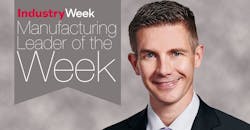A Conversation with Honeywell's John Waldron
Companies survive and thrive due to their ability to continually adapt to new market paradigms and new technology. With those intentions firmly in place, Honeywell acquired warehouse automation company Intelligrated for $1.5 billion in 2016. By bringing this company, which had a customer base valued at $5 billion, into the fold Honeywell wanted to ensure that it would be competitive in the retail space.
At the time of the acquisition, John Waldron, president of Honeywell’s Safety and Productivity Solutions, said that Intelligrated’s solutions of workflow performance solutions including cloud-connected mobile worker applications, high-performance data collection hardware, and other technologies would help expand Honeywell’s global presence.
IndustryWeek talked to Waldron about the current technology landscape.
IW: How has your division fared since the acquisition of Intelligrated?
JW: Looking at the current economic conditions, eCommerce is the force driving changes in retail. It exerts a huge influence on all elements of the supply chain and we are in the middle of that. The tools provided by the Intelligrated acquisition allow us to compete effectively.
This technology is part of the larger field of IoT. This technology enables us to use sensors, both in our products and those of our customers, to increase the level of data available and produce better business decisions. What’s changing is that we continue to ride the curve of Moore’s Law for speed and capacity. We are getting to point of inflection where the size and power of the IoT are becoming cost effective which enables a host of applications.
Our division is in the middle of these trends and this is the wind in our sails.
IW: As this technology is now more readily available, do you see increased confidence by your customers that enable them to purchase more or are they still holding on to cash?
JW: Customers are trying to be a bit more conservative due to previous overextension. We see still a lot of cash on balance sheets and credit is available. Customers are smart and are requiring a high return on investments. Some technologies can have an ROI of less than a year.
There are still a lot of companies that still rely on paper-based systems, so there is room for a lot of improvement.
Of the most efficient way to improve all types of systems is through automation. Many companies are turning to automation as a way to improve processes but it is also a way to remain competitive. It can mitigate the risk of future uncertainty both in terms of sales and labor market pressures.
IW: All companies are having issues creating a future talent pipeline. What programs is your company pursuing to find employees with the right skill sets?
JW: We have close relationships with a number of universities. We use both internships and co-ops to bring students into our company. We cross-train and we help employees develop new skills. In addition to helping younger employees learn new functions, we do the same for our current employees. For example, some of our long-term engineers haven’t been writing code for AI so we provide that learning.
As a company, we have invested in learning centers across the nation and across the globe. Last year we created a Software Center in Atlanta. And this year we joined Georgia Tech’s Center for the Development of the Internet of Things Technologies. These research and education efforts will continue.
IW: As leadership is one of the keys to success, how would you describe your leadership style?
JW: My style is to be direct and down to earth. The more real we can be with another the faster we can get results. I have been with the company a long time and of the most important things I have learned is that the world is changing faster than we would like to believe. My job has changed as has the company and therefore I have developed an appetite for change. In this company, those that like change and can handle new adventures do very well.
